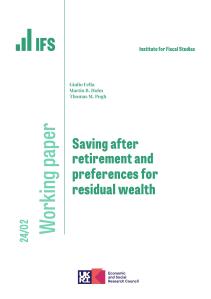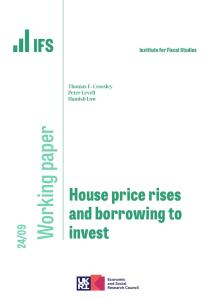Many working-age people already have one or more pension pots that they have stopped contributing to. Some savers stand to lose thousands of pounds if they do not move older pensions to ones that offer better value for money.
This is the main implication of the findings of new research, funded by the Economic and Social Research Council, and published by IFS today. The research examined novel data from an online company, Profile Pensions, on the deferred defined contribution pensions held by a large sample of its potential customers.
The research found that:
- Many deferred pensions held by a sample of those in their 50s are in schemes with charges that are high relative to current market standards.
- Deferred pensions started longer ago typically have higher fees than pensions started more recently, and these differences do not look justified by better performance. Charges have fallen over time and deferred pensions often do not reflect these changing market conditions.
- Among people in their 50s contacting Profile Pensions, the average annual fee for deferred pensions taken out in the 1990s is above 1.1% of fund value, compared with around 0.9% for pensions taken out in the 2000s and 0.8% for pensions taken out in the 2010s. Very few pensions taken out a long time ago have low charges: four-fifths of the pensions started in 2013 have a charge of 0.75% or less, compared with just one-in-four of the pensions started in 2003 and one-in-nine of the pensions started in 1993.
- While the difference between 1.1% and 0.8% sounds small, it can make an important difference to retirement resources when cumulated over many years. For example, for a 50-year-old with a pot of £21,000, it would amount to a difference of around £2,400 at age 67 in today’s prices if annual investment returns going forwards are the same as the average over the past five years.
- Older deferred pensions may also not be invested in the way that people now want. Unlike with pensions taken out more recently, the equity allocation of pensions started longer ago is less likely to line up with a current assessment of people’s willingness to take on risk.
- This may be a particular issue for people approaching retirement, among whom the proportion of their pension funds invested in equities varies according to when their pension was started. Specifically, among pensions taken out more recently, there is a decline in the share invested in equities at older worker ages; no such decline is seen among pensions taken out longer ago.
Kate Ogden, a Research Economist at IFS and one of the authors of the report, said:
‘It is vital that people get the most out of the retirement saving they have done over their working lives. This won’t happen automatically. Older personal pensions risk becoming poor value for money. The fees charged are often higher than those on pensions taken out more recently. In addition, how they are invested can become less appropriate as individual circumstances change. Many would benefit from taking active decisions over their past pensions, and this needs to be made easier to do. But greater individual engagement will never completely fix this issue, and policymakers need to consider wider initiatives to encourage value for money in older pensions.’










